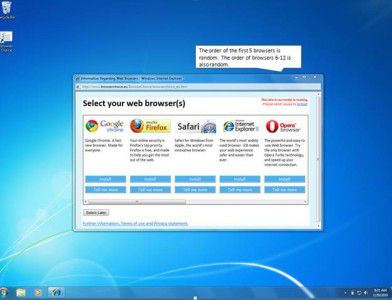- Qualcomm Launches Snapdragon 4 Gen 2 Mobile Platform
- AMD Launches Ryzen PRO 7000 Series Mobile & Desktop Platform
- Intel Launches Sleek Single-Slot Arc Pro A60 Workstation Graphics Card
- NVIDIA Announces Latest Ada Lovelace Additions: GeForce RTX 4060 Ti & RTX 4060
- Maxon Redshift With AMD Radeon GPU Rendering Support Now Available
Microsoft’s Browser Choice Screen Working Well for its Competitors
We’ve talked a fair bit in the past about Microsoft’s browser-selection pop-up that has been introduced to European users of Windows, but since it’s been implemented, it’s been difficult to know what kind of effect it’s had on overall browser adoption. While the numbers still aren’t definitive, it looks like every browser company aside from Microsoft has a good reason for cheering.
According to Mozilla, Firefox had achieved 50,000 downloads due to this multiple-choice screen, and Opera noted that it saw a stark increase of 3x the number of downloads in Belgium, France, Britain, Poland and Spain. As for the rest of the browsers available in this screen, it doesn’t appear as though the developers behind them have spoken up. It’s also hard to say whether users took a chance on an alternate browser due to familiarity with the name, the logo, or the description, but that’s a poll I’d be really interested in reading about.
As far as I’m concerned, Microsoft has been forced to essentially give free advertising to its competitors by the EU, and the fact that it seems to be working to the favor of the companies that helped persuade this to happen disgusts me. I also believe it’s grossly unfair that Apple’s Mac OS X hasn’t been targeted, despite it following the exact same “fault” of Microsoft, by including a default browser. To be fair, though, given the mentality of the people who forced Microsoft into this position, it’s likely they’ve never even heard of Apple or Mac OS X before.
I’d love to know what you guys think about all this, and especially whether you disagree or agree with me (yes, I’m willing to bet more would disagree than agree with me). Do you think it’s fair that Microsoft was forced into advertising for its competitors? Or do you like the fact that the lesser-known IE competition is finally becoming better known to regular users who otherwise might not have known of other options?

Microsoft said it was too early to tell whether the choice screen might prompt significant numbers of users to change. The digital ballot is being delivered over the Internet with software updates, and it is expected to take until mid-May to complete the process. The browser choice will also be presented to buyers of new Windows computers across the European Union for five years. The commission has not publicly set targets for browser downloads or market shares. It said Friday that it had not yet received any results, though Microsoft has pledged to keep it informed.




